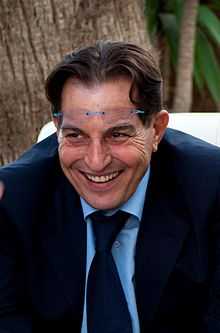Rosario Crocetta
| President Rosario Crocetta | |
|---|---|
 | |
| President of Sicily | |
| Incumbent | |
| Assumed office November 10, 2012 | |
| Preceded by | Raffaele Lombardo |
| Member of the European Parliament | |
| In office 2009–2014 | |
| Personal details | |
| Born | 8 February 1951 Gela, Italy |
| Political party | Democratic Party |
| Religion | Roman Catholic[1] |
Rosario Crocetta (born 8 February 1951 in Gela, Sicily) is the President of Sicily in Italy. He was the first openly gay mayor in Italy when he became mayor of Gela in 2003.[2] A prominent figure in the fight against Mafia, in 2009 he was elected as Member of the European Parliament. He became President of Sicily following the Sicilian regional election, 2012.
Political career
Crocetta started his political career in the 1980s within the Italian Communist Party (dissolved in 1991), later joining the Communist Refoundation Party. In 1998 he was appointed as Councillor for Culture in the City Council of Gela with the Federation of the Greens, and was engaged in cultural projects shared between Mediterranean countries. In 2000 he joined the Party of Italian Communists. In 2001-2002 he worked as Councillor for Public Education in Gela.
In May 2002, he contested the mayoral elections for Gela as a center-left coalition candidate. At first, right-wing candidate Giovanni Scaglione was declared elected, with a narrow margin of 197 votes. But in 2003, the Administrative Court of Sicily established that electoral frauds took place in town elections and subsequently proclaimed Crocetta as mayor. Telephone tappings revealed that a local Mafia boss ordered a returning officer to "move heaven and earth in order to avoid the communist faggot to win".[3] Since then, being the first openly gay mayor of Italy, he became for many a symbol of the fight against obscurantism and organized crime in Sicily. In 2007, he was re-elected mayor of Gela with 64.4 percent of the votes.[4]
In 2008, he joined the Democratic Party. In the 2009 European elections he was elected as a member of the European Parliament for the Italian Islands constituency with 150,091 votes.[5] In 2012, Crocetta ran as gubernatorial candidate against Sebastiano "Nello" Musumeci of the Berlusconi's PDL party and eight minor contestants. Crocetta ran in Sicily on the ticket of La Rivoluzione è Già Iniziata (The Revolution Has Already Started) and obtained 30.5 percent of the votes, becoming the first left-wing governor of Sicily since 1947.[6][7]
Fight against Mafia
Throughout his political career Crocetta has been a forthright proponent of the fight against organized crime in Sicily. Consequently, he has been the target of several Mafia attacks.
In 2003, a plot to kill Crocetta during the patronal feast of the Immaculate Conception involving a Lithuanian killer was thwarted by the local Carabinieri.[8] After that episode, Crocetta was placed under security.
In 2008, a failed plan to kill Crocetta was made public by the district attorney of Caltanissetta; as a result, Crocetta was immediately placed under tighter security.[9]
In 2010, a new assassination plot against Crocetta was thwarted, and five people affiliated with the local Mafia were arrested.[10]
See also
Notes
- ↑ Pellegin, Paolo (September 25, 2013). "Can a Gay, Catholic Leftist Actually Squelch Corruption in Sicily?". The New York Times. The New York Times Company.
- ↑ "Sindaco gay a Gela". La Repubblica. March 11, 2003. Retrieved 31 October 2012.
- ↑ "Crocetta: "Così ho vinto la mafia"". La Repubblica. May 15, 2007. Retrieved 31 October 2012.
- ↑ "Elezioni comunali 2007". La Repubblica. May 15, 2007. Retrieved 31 October 2012.
- ↑ "2009 European Parliament elections". Italian Ministry of Internal Affairs. Retrieved 06-09-2009. Check date values in:
|accessdate=(help) - ↑ "Sicily's electoral shock". The Economist. Oct 30, 2012. Retrieved 31 October 2012.
- ↑ "Regional Election Results 28 October 2012, Sicily".
- ↑ "Gela, per eliminare il sindaco la mafia paga un killer lituano". La Repubblica. September 8, 2004. Retrieved 31 October 2012.
- ↑ "Un piano di morte per Crocetta i preparativi ascoltati in diretta". La Repubblica. February 9, 2008. Retrieved 31 October 2012.
- ↑ "Gela, dal carcere duro la condanna a morte". La Repubblica. January 20, 2010. Retrieved 31 October 2012.
| ||||||||||||||||
| ||||||